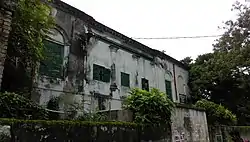Boro Kuthi
Boro Kuthi (Bengali: বড়কুঠি) is a historic building in Rajshahi, Bangladesh built by Dutch traders in eighteenth century.[1] The building was also used as the first administrative center for Rajshahi University.[2][3] The building is now under the Ministry of Cultural affairs to preserve as a cultural heritage, and planned to turn as a museum.[4][5]
| Boro Kuthi | |
|---|---|
 | |
| Location | Rajshahi |
| Built | 18th century |
| Architectural style(s) | Indo-Saracenic Revival architecture |
History
Located on the band of Padma river, it is belied to be built by Dutch traders during first of eighteen century.[2][6][7] During that period several other building such at Motihar kuthi were constructed in the area for silk and indigo trading. When Dutch traders left India after the fall of Nawab Siraj ud-Daulah in 1757, they handed over the building to British East India Company. The company later sold the building to Robert Watson and Company in 1833. After the British left in 1947, the building was used as government's supply center. In 1953, the building was handed over to newly started Rajshahi University to use as its administrative building. The building was handed over again to the Ministry of Cultural Affairs to preserve as a heritage site of the city.[8]
Building description
Boro Kuthi is located on the bank of the river Padma, south of Rajshahi College. It is a two storey, 24 meters length, 17.4 meters wide building with twelve rooms of different size. There is a hall room which is 9.6 meters in length and 6.3 meters wide at the center first floor, with two balcony on north and south side.[2] Though the building was used for silk and indigo trading, it is believed the Portuguese used the building as a fort during emergency time. Three canons which were recovered from the site are now be Rajshahi Police line.[2][6][9]
References
- "ডাচ্ প্রতিনিধিদলের রাজশাহীর বড়কুঠি পরিদর্শন". Prothom Alo. Retrieved 4 September 2019.
- "সর্ব প্রাচীন ভবন বড়কুঠি". Archived from the original on 27 February 2015. Retrieved 4 September 2019.
- বরেন্দ্রের বাতিঘর - অগ্রযাত্রার ৩ বছর - রাজশাহী সিটি কর্পোরেশন
- "অবহেলায় পড়ে থাকা বড়কুঠিতে হবে জাদুঘর". Bangla Tribune. Retrieved 4 September 2019.
- "রাবির প্রথম প্রশাসনিক ভবনের মালিকানা হস্তান্তর". Bangla News24. Retrieved 4 September 2019.
- "রাজশাহীর নীলকুঠি হেরিটেজ নয়, হচ্ছে পুলিশ ফাঁড়ি!". banglanews24.com. Retrieved 4 September 2019.
- মিছের, কাজী মোহাম্মদ (1965). রাজশাহীর ইতিহাস ১ম খন্ড. Kazi Publishers.
- "Chhatra Federation protest at Boro Kuthi handover". New Age. Retrieved 4 September 2019.
- "Move to turn Boro Kuthi into heritage site". The Daily Star. Retrieved 4 September 2019.